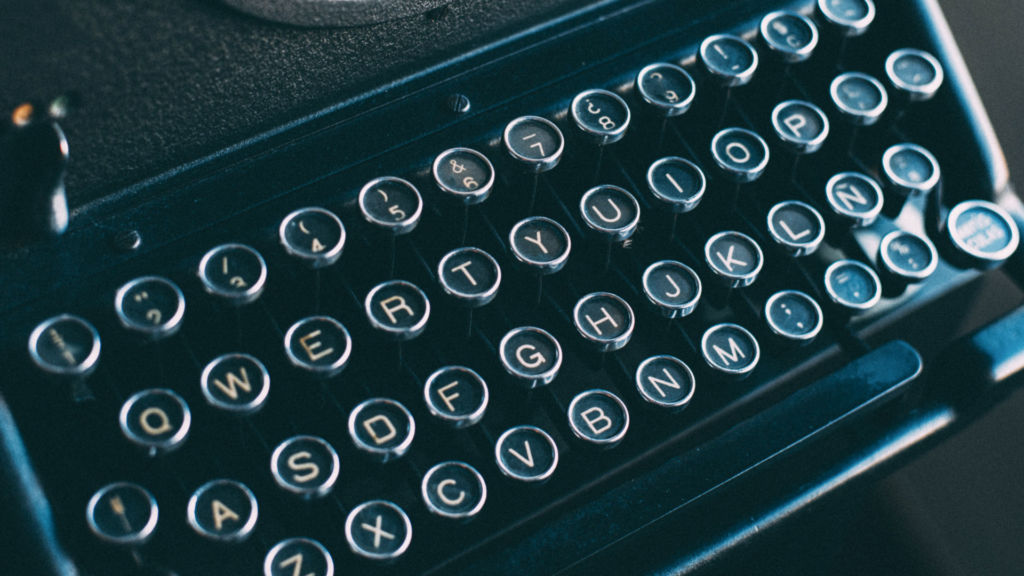
It can be difficult to get yourself back into the writing chair in the new year at the best of times, and 2020 wasn’t a great year for anyone.
Whether you took a break from writing during the holiday season, or just find it difficult to get going again after too much good food and drink, getting writing again can be harder than it sounds. Here are some tips and tricks to help you get comfortable in that writing chair whether you’re just starting out, coming back to it after a break, or are just looking for a new challenge.
Writing is like Eating Chocolate Cake
Writing is like a good dessert: little and often is better than wolfing down a whole cake in one sitting. If you haven’t written for a while – or are starting as a New Year resolution – getting going can be tough. You might find the words don’t come, or everything reads like an accident involving a monkey and typewriter. Don’t worry. It’s completely normal.
It’s surprisingly easy to find distractions when you’re not in the right frame of mind, whether it’s browsing Amazon, looking at cat videos, or following a trail of links through Wikipedia. The key here is to ease yourself back into it. Start small, even if the aim is to write a single paragraph on day 1 and build from there. For writers who work in blocks of time rather than word count targets, start with a smaller block of time than usual, and extend it a little with each writing session.
Writing is like Professional Sports
There aren’t many similarities between writing and sports, and only one of the two activities will help you lose that excess Christmas weight. However, one commonality is that both require practice, and in this regard, writing has the edge. If you want to run a marathon, for example, you’ll need to put in hard hours running shorter distances. Practice for writers, on the other hand, involves actual writing. At the end of it you’ll have an end product, whether it’s flash fiction, a short story, or a novel. If you’re struggling to get going in the new year, then trying a shorter standalone piece might help you get back into your rhythm again.
The absolute worst that can happen is you have another story gathering cobwebs somewhere, but you might well end up with a finished story you can submit to a magazine for publication, and renewed enthusiasm for your next project.
Writers are like Chameleons
Perhaps we can’t disappear in a crowd like Jason Bourne, but writers possess a certain chameleon-like nature, and express it through fiction. Writers regularly put
themselves in their characters’ shoes, change viewpoint characters from chapter to chapter, and write dialogue in the style of someone who exists only in their head. These all help a writer become more adaptable, and more confident in their craft. If writing in smaller chunks of time or working on shorter fiction doesn’t feel like enough of a challenge to get you writing again, there’s another option for you: genre.
Most writers work in one or two genres and rarely stray beyond them. Iain Banks was one notable author who regularly switched: a commercial novel like The Wasp Factory would then be followed by a Sci-Fi novel such as Consider Phlebas or Against A Dark Background. A little bit of change can be a good thing, so trying your hand at fiction in another genre might be just what you need to get you writing again. And who knows, a short story or flash fiction piece might give you ideas for your next novel. If nothing else, you can have a bit of fun trying something new.
Writers are like Globe-Trotting Supermodels
Travel is restricted across much of the world in early 2021, leaving many holiday plans on hold or cancelled. So, while travelling the world from one glamorous location to the next isn’t possible for writers at the moment, our characters can travel the world – and even beyond it. Setting is an element often neglected in fiction, but when used to good effect it can be hard to imagine the story happening anywhere else. Ian Rankin’s Rebus novels, for example, are so rooted in Edinburgh it’s almost impossible to imagine them set elsewhere. By way of contrast, Lee Child’s Jack Reacher novels take place in a variety of different locations. The wandering hero drifts from place to place, and each location adds colour and depth to the story, whether it’s a small town and its feuding families, or corruption and crime in the big city.
Imagination is the writer’s most powerful tool, so although travel may be limited, our fiction can take us to places we cannot ourselves reach right now. It may be a poor substitute for actual travel, but research and imagination can transport writers and readers alike to strange new places. A change of setting for your fiction could be just what you need to get writing again.
The Ultimate Extreme Writing Challenge
Starting small, dabbling in short(er) fiction, switching genre, and changing your setting are all ideas to get you back in your writing chair. There’s one final nuclear option though, if you think you can handle the ultimate extreme writing challenge.
 There are degrees of scale, but most writers fall into one of two categories based upon how they work. The first group is the plotters, writers who typically come up with an outline before putting fingers to keyboard or pen to paper. Some, much, or all of the plot may exist before the first chapter is written. The rest of us call ourselves “discovery writers” or something equally abstruse, but everyone else just calls us “pantsers” – from the expression fly by the seat of your pants (trousers if you’re British; there’s no requirement to write in your underwear). We’ll happily start chapter one without a clue how the story’s going to end, and sometimes no idea what will happen in the next chapter.
There are degrees of scale, but most writers fall into one of two categories based upon how they work. The first group is the plotters, writers who typically come up with an outline before putting fingers to keyboard or pen to paper. Some, much, or all of the plot may exist before the first chapter is written. The rest of us call ourselves “discovery writers” or something equally abstruse, but everyone else just calls us “pantsers” – from the expression fly by the seat of your pants (trousers if you’re British; there’s no requirement to write in your underwear). We’ll happily start chapter one without a clue how the story’s going to end, and sometimes no idea what will happen in the next chapter.
At the polar extremes, these are two very different ways of working. If you’re looking for inspiration, or just want to try something new, then writing using the other method is a challenge about as extreme as you can ask for. It could go terribly, horribly wrong, and it will almost certainly be very challenging. But you might also find it liberating. Even if you don’t prefer the alternative approach, you’ll probably still emerge from the experience a better writer. It’s the literary equivalent of throwing a parachute out of a plane at 30,000 feet then diving after it and seeing if you can catch it on the way down. It’s not for the faint-hearted, but if it works the results could be spectacular. The only way to find out is to try it…





Leave A Comment